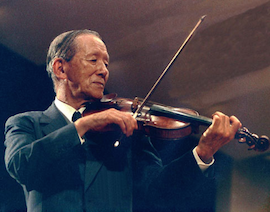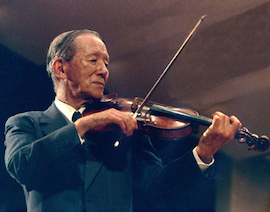
Sinichi Suzuki, the man behind the Suzuki Method, used by millions of children over more than the past half century, is now being accused of lies and false claims by a musician (with a teaching method of his own), who has made these charges before.
U.S. violin teacher Mark O'Connor's blog made assertions such as Suzuki being rejected from the prestigious Berlin music school he had claimed as his alma mater. A week ago, Norman Lebrecht of Slipped Disc cited the Daily Telegraph headline on Suzuki: "The biggest fraud in music history?" And so the hubbub began, which was louder than the same debate a year ago.
Suzuki, 1898-1998, had claimed Einstein was his "guardian" and that he spent eight years in the 1920s studying at Berlin's Hochshule für Musik. O'Connor says Suzuki was rejected at auditions to the school, and his relationship with Einstein was nonexistent.
The International Suzuki Association has issued a statement in rebuttal of O'Connor's allegations, several respected musicologists disputed O'Connor, and on Saturday Lebrecht backpedaled furiously to say:
One can only speculate as to why Mr. O’Connor, who publishes and sells his own approach to violin playing, is so eager to discredit Shinichi Suzuki and why he has chosen to manipulate media at this time.These may be questions for serious journalists to work on further. In the end, however, it is not what Shinichi Suzuki did or did not do in the 1920s that is of importance. The important issue is the successful use of his teaching principles which have enriched the lives of students and has positively influenced music education worldwide for the past 70 years.

